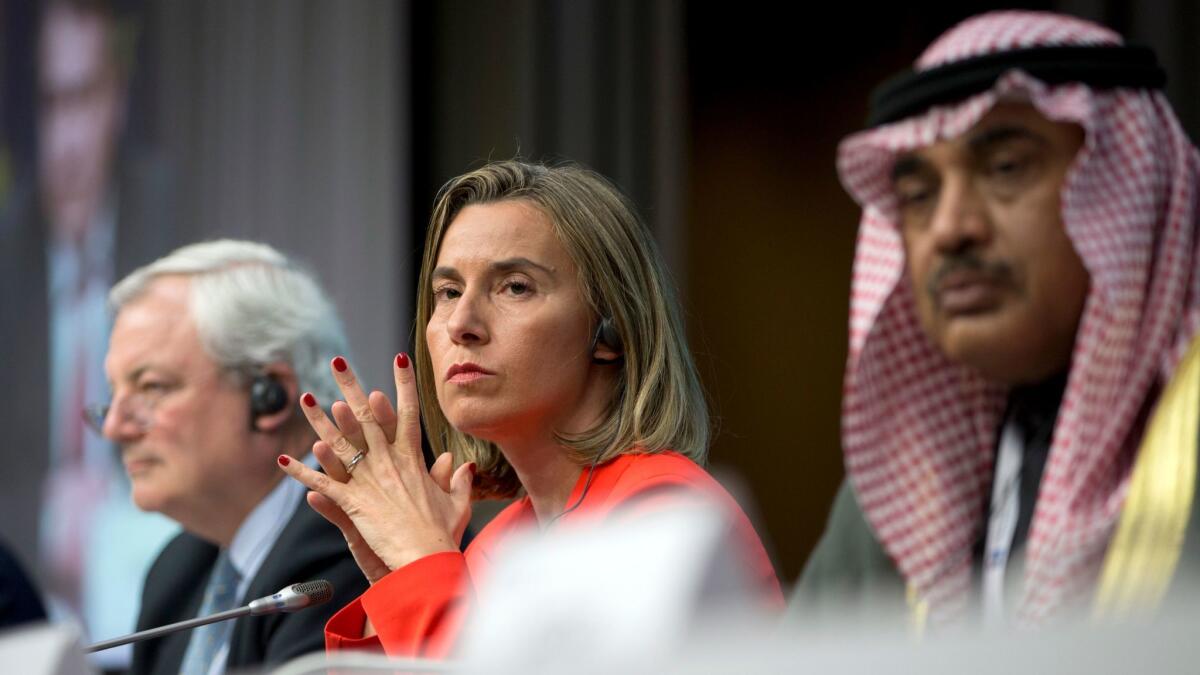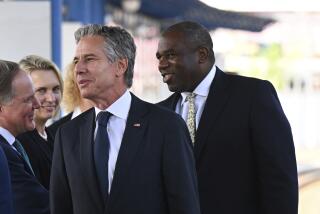Leaders from various nations pledge $6 billion in humanitarian aid for Syria

Senior officials from the European Union, Middle Eastern nations and the U.S.on Wednesday pledged $6 billion in humanitarian aid to support Syria, one day after a gas attack in the northern province of Idlib killed at least 72 people and injured hundreds.
Ministers met in Brussels at a conference hosted by the EU and the United Nations to raise funds for humanitarian relief in Syria, where more than 400,000 people have been killed since the country’s civil war began in 2011.
The meeting was intended to raise funds and back peace talks in Syria, but Tuesday’s devastating attack overshadowed the event.
“The images we’ve seen yesterday from Syria remind us that here we all have a responsibility,” said Federica Mogherini, the EU’s foreign affairs chief.
Several European ministers heaped blame on Syrian President Bashar Assad for the deadly assault.
“All the evidence I have seen suggests that this was the Assad regime, who did it in the full knowledge that they are using illegal weapons in a barbaric attack on their own people,” British Foreign Minister Boris Johnson said.
French Foreign Minister Jean-Marc Ayrault told reporters there was “no doubt” that Assad was responsible for the attack.
The nations pledged $6 billion Wednesday but expect to need a total of $8 billion in and around Syria this year, according to a United Nations estimate.
Mogherini told reporters the Brussels conference was needed to bolster ongoing U.N.-backed peace talks in Geneva, although a breakthrough still seems far off. Russia, a close ally of Assad, has not appeared willing to abandon the Syrian government.
The Russian Foreign Ministry criticized a U.N. resolution backed by the United States, the United Kingdom and France that blames the Syrian government for the deadly attack in Idlib.
Donald Tusk, the president of the European Council, pointed at countries allied with Assad for turning a blind eye to the violence.
“The Syrian regime bears the primary responsibility for the atrocities. But all those who support the regime share the moral and political responsibility for the situation,” Tusk said, referring to the Idlib attack during a visit to Greece.
German Foreign Minister Sigmar Gabriel said there cannot be a peace agreement between Assad and opposition groups in Syria without support from Russia and the United States.
But Gabriel told reporters that he is concerned the U.S. may not be committed to supporting political change in Syria.
“Our worry is that the U.S. concentrates a lot on the fight against ISIS and on the terrorists and accepts that Assad and his regime will stabilize itself,” Gabriel said, calling “the political process” in Syria “at least as important as the fight against terror.” ISIS is an acronym for Islamic State.
The Trump administration has signaled that it will prioritize the fight against Islamic State over efforts to remove Assad from power.
Secretary of State Rex Tillerson said during a visit to Turkey last week that Assad’s long-term status “will be decided by the Syrian people.”
Middle Eastern ministers in Brussels called for more humanitarian aid for their countries, which are buckling under pressure from the Syrian crisis.
Lebanese Prime Minister Saad Hariri told conference attendees that “the time has come to implement long-term solutions for this long-term crisis.” Lebanon has taken in more than 1.5 million Syrian refugees.
Mogherini wanted ministers at the Brussels conference to consider how they could help rebuild Syria after the violent conflict there ends. But several ministers indicated that they will not pay for reconstruction until there is a political solution to the conflict.
European governments have been cautious about spending money in Syria while the fighting continues because they do not want funds misused by the Assad government. A declaration endorsed by Mogherini and ministers from five countries said they would fund efforts to reconstruct Syria “once a credible political transition is firmly underway.”
Johnson said the British people “will not accept that their money should in any way go to those who are responsible for these crimes.”
Stupp is a special correspondent.
More to Read
Sign up for Essential California
The most important California stories and recommendations in your inbox every morning.
You may occasionally receive promotional content from the Los Angeles Times.










